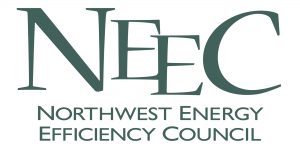Last week, Seattle Mayor, Bruce Harrell, announced the proposed City of Seattle Building Emissions Performance Standard (BEPS). He was joined by the Office of Sustainability & Environment (OSE) Director, Jessyn Farrell, as well as the staff of the OSE who have been developing this policy for over two years and other leaders from environmental, housing, and labor organizations. NEEC was grateful to have served on the Technical Advisory Group as the policy was developed, and to join with our peers to celebrate the announcement of this important policy. BEPS will assure that multifamily and commercial facilities in Seattle that are subject to the policy achieve net zero greenhouse gas emissions by 2050, the date by which we must decarbonize our entire economy to avoid the worst impacts of climate change. OSE designed the policy to intentionally complement the state’s Clean Building’s Standard targeting multifamily and commercial facilities larger than 20,000 square feet (Tier 1 and Tier 2 buildings in the vernacular of the Clean Buildings Law). Please read on for information from OSE staff with links to documents that describe the proposed emissions standards and other details of the policy.
UPDATED PROPOSED BUILDING EMISSIONS PERFORMANCE STANDARD (BEPS) POLICY GUIDES
OSE has developed these guides to help building owners, managers and others learn about the proposed BEPS regulations, timeline, support programs and benefits. For more information, fact sheets and case studies, visit: www.seattle.gov/building-performance-standards.
————–
NOTICE OF DETERMINATION OF NON-SIGNIFICANCE FOR PROPOSAL TO ESTABLISH A BUILDING EMISSIONS PERFORMANCE STANDARD
Pursuant to SMC 25.05.340 and WAC 197-11-340
The proposal would establish a standard using greenhouse gas intensity targets (GHGIT) that step lower over time intervals, to require that affected buildings meet a net-zero greenhouse gas emissions standard (or authorized alternative performance level) by a certain year between 2041-2050 depending on the building size, across a variety of use types. This would apply to non-residential buildings (with some exceptions like industrial buildings) and residential buildings located in Seattle with a gross floor area greater than 20,000 square feet excluding parking, that exist prior to the required compliance deadline. This would call for energy-efficiency and decarbonization improvements to be made to affected buildings over time, except all-electric buildings would be exempt from meeting the GHGIT.
ENVIRONMENTAL DETERMINATION
After review of a completed environmental checklist and other information on file, the Seattle Department of Construction and Inspections (SDCI) has determined that the amendments described above will not have a probable significant adverse environmental impact, and has issued a Determination of Non-Significance (DNS) under the State Environmental Policy Act (no Environmental Impact Statement required).
HOW TO COMMENT
Comments regarding this DNS or potential environmental impacts may be submitted through June 22, 2023. Comments may be sent to:
City of Seattle, SDCI
Attn: Gordon Clowers
P.O. Box 94788
Seattle, WA 98124-7088
HOW TO APPEAL
Appeals of the decision to issue a Determination of Non-Significance (DNS) must be submitted to the Office of the Hearing Examiner by 5:00 p.m., June 29, 2023. Appeals should be addressed to the Hearing Examiner and must be accompanied by an $85.00 filing fee in a check payable to the City of Seattle. The appeal must be sent to:
City of Seattle
Hearing Examiner
PO Box 94729
Seattle WA 98124-4729
INFORMATION AVAILABLE
Copies of the DNS and the proposal may be obtained online at https://www.seattle.gov/environment/climate-change/buildings-and-energy/building-performance-standards
Questions about the proposed amendments and the environmental determination can be directed to Sandra Mallory, OSE, at [email protected].
